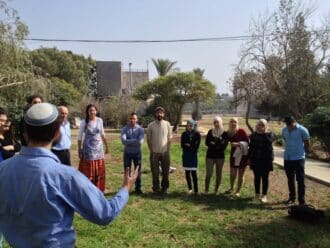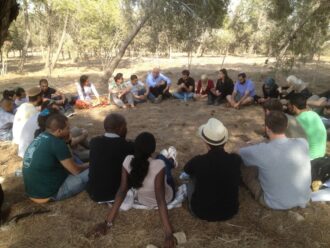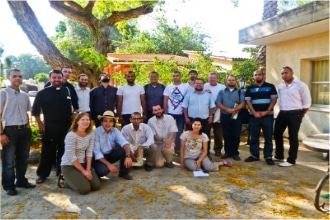Holy Land Seminarians Faith and Ecology Project brings together Muslim, Christian, and Jewish seminary and other students from the Holy Land for interactive seminars on human coexistence and environmental sustainability. The Project educates emerging clergy about sustainability challenges and religious teachings that can address them. The seminars also help Christian, Muslim, and Jewish participants find common cause through shared religious teachings on sustainability. The seminars focus on how we live on the land (environmental sustainability) and how we live together (human sustainability). The sessions include experiential, on-the-ground explorations of contemporary ecological and social challenges led by experts from each of the three faiths. Some of the sessions also involve joint learning and presentations about Jewish, Muslim, and Christian teachings on these issues.
The seminars are being implemented in partnership with Rabbis for Human Rights, based on the support of The Julia Burke Foundation, Anne Frank Fonds, and the British Shalom Salaam Trust.
2014 Seminar at the Jordan River


On March 31st, 2014, a group of Jewish and Christian seminary students, clergy, and others spent a day at the Jordan River in a seminar organized and facilitated by the Interfaith Center for Sustainable Development (ICSD) and Ecopeace Middle East. To read a news article about the ‘Interfaith Jordan River Seminar’, click here and to read more about this seminar on our blog, click here.
Seminars in 2013 at Mount Gilboa and the Yarkon National Park
On October 31st 2013, the Interfaith Center for Sustainable Development, together with Rabbis for Human Rights, held an interfaith seminar with Jewish, Muslim, and Christian students. To read a blog post about this seminar at Mount Gilboa, click here. To read about another seminar which took place at the Yarkon National Park in March 2013 , click here.
Three Seminars in 2012 on Climate Change, Water, and the Jordan River
The project was successfully piloted in the spring of 2012 through a series of three seminars, based on the support of the Julia Burke Foundation and Anne Frank Fonds. The first seminar took place in conjunction with the Interfaith Conference on Climate and Energy on March 19th, 2012. The seminar focused on climate change and renewable energy from an inter-religious perspective. Participants heard live and pre-recorded addresses from prominent religious leaders, and then discussed the issues in small groups.
The second seminar took place on April 16th, 2012 and was held at the Jerusalem Inter Cultural Center, next to Armenian Quarter of the Old City of Jerusalem. It focused on Christian, Muslim, and Jewish perspectives on water, especially in regards to water in the Holy Land.The third seminar took place on May 30th, 2012, and focused on the Jordan River Valley from a faith perspective and ecological lens. It was implemented in collaboration with Friends of the Earth Middle East (FOEME) and Rabbis for Human Rights.
Why We Are Doing This
The Holy Land is particularly vulnerable to water scarcity and climate change. Environmental challenges transcend borders, creating a basis of joint concern that can act as a foundation upon which to build mutual understanding and cooperation. Interfaith environmental education and action has tremendous potential to spur goodwill and peace-building in this conflict-prone region.
Goals
- Cultivate a strong group of emerging Christian, Muslim, and Jewish clergy who are well informed about the sustainability challenges we confront
- Enable these emerging religious leaders to find common cause through shared religious teachings on environmental sustainability and human coexistence
- Help participants gain a deeper understanding of the religious teachings on sustainability within their own faiths and an appreciation of similar teachings from other faiths
- Promote greater awareness of the depth of wisdom available to address sustainability challenges from a faith perspective, and empower participants to teach their faith’s wisdom






Cultivating a cohort of religious leaders with a shared understanding of the human and environmental challenges facing the region helps bring a voice of moderation and healing to the Israeli-Palestinian conflict. This is an example of how the environment can play a key role in peacemaking. The influence of these clergy within their respective societies magnifies the impact of this program beyond the immediate group of participants.
Outcomes
Participants conclude the seminars having undergone training in cross-cultural dialogue and leadership and having examined environmental issues and religious teachings on them. We receive media coverage for the closing session of the program, which are open to the media and broader community. Upon successful implementation of this Jerusalem pilot, the program could be replicated in the Galilee region of Israel as well as in New York, Boston, and Los Angeles—all locations in which Muslim, Christian, and Jewish seminary students study.
Methodology
Our methodology endeavors to be clear from the outset to participants and presenters concerning the interests, needs and expectations of the participants and the presenters, so as to avoid unnecessary conflict or tension during the seminars. We intend to avoid formal discussions about political issues and to choose seminar topics and speakers that would facilitate this. The seminars will include components on group building, wilderness experience, field trips, inter-textual study sessions, facilitated dialogue, conflict resolution, and non-violent communication. We will provide reading materials from journal articles and other sources that will inform each seminar, and which will be distributed to the participants prior to each seminar.
Funding Opportunity
The continuation of this project is funding dependent. For sponsorship opportunities, please contact us. In June 2012, the Council of Religious Institutions of the Holy Land endorsed the following statement that the Interfaith Center for Sustainable Development submitted to them:
In advance of the Rio +20 United Nations Earth Summit, The Council of Religious Institutions of the Holy Land (CRIHL)*, constituting the high representatives of Israeli and Palestinian religious authorities, recognizes the imperative for action posed by the environmental challenges facing humanity. We also recognize the spiritual roots of this crisis, and the importance of a religious response to promote more environmentally sustainable living. We call on adherents of our faiths in the Holy Land and worldwide to address this crisis by undertaking a deep reassessment of our spiritual and physical relationship to this God-given planet and how we consume, use and dispose of its blessed resources.
In particular, we acknowledge the scientific basis of human-caused climate change and the threat it poses to human societies and the planet, as articulated by the United Nation’s Intergovernmental Panel on Climate Change. We also call all people of faith to reduce their personal emissions of greenhouse-gases and to urge their political leaders to adopt tangible, science-based targets for the reduction of greenhouse gases in order to avert the worst dangers of the climate crisis. We hope that environmental challenges in our common home of the Holy Land and Planet Earth move religious adherents to overcome inter-religious strife and work together for ours and our children’s common well-being.
* The CRIHL represents the high religious authorities of the Holy Land: the Chief Rabbinate of Israel, the Palestinian Ministry of Religious Affairs (Waqf), the Palestinian Sharia Courts and the assembly of the Heads of Churches of Jerusalem. For more information, please visit the CRIHL website: www.crihl.org.
ICSD works on a global basis, with current engagement in Africa, the Middle East, North America, and Europe.
